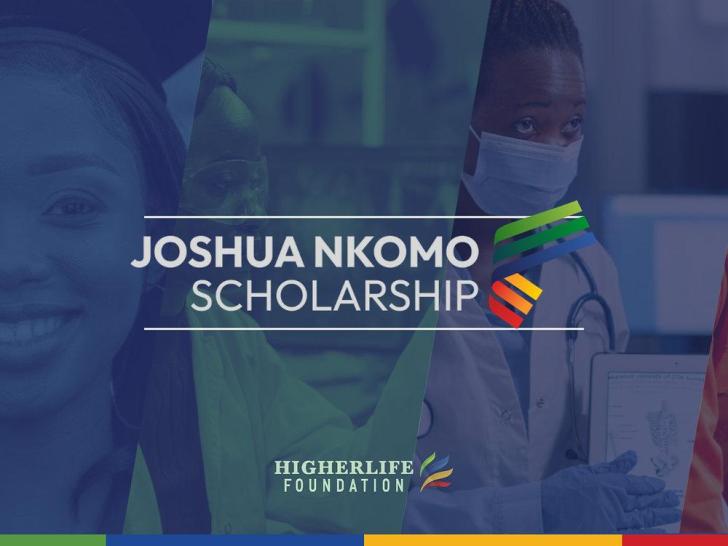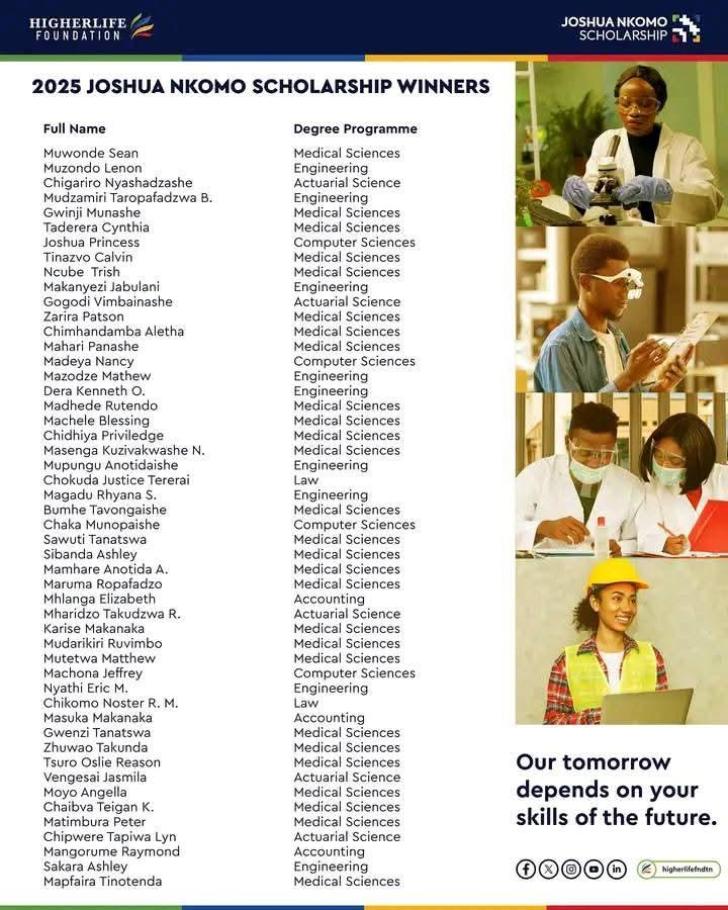News / National
50 Joshualites awarded Scholarships amid debate over tribal bias
12 hrs ago | Views

Fifty academically gifted students from across Zimbabwe's 10 provinces have been awarded the prestigious Joshua Nkomo Scholarship, administered by the Higherlife Foundation, in the latest effort to support the country's future leaders in higher education. The recipients, now known as "Joshualites," reflect the foundation's commitment to academic excellence, leadership development and gender parity.
The scholarship, now in its 19th year, was launched in 2006 to support 100 students annually — 10 from each province — with a 50-50 gender representation target. This year's intake, however, was 60% female and 40% male, reflecting growing female participation in academic excellence.
While the scholarship covers students in all disciplines, it places increasing emphasis on Science, Technology, Engineering, and Mathematics (STEM), particularly targeting those pursuing engineering, medicine and entrepreneurship. Candidates must obtain a minimum of 14 points at A-Level and demonstrate leadership potential and integrity.
To date, the Joshua Nkomo Scholarship has supported over 3,100 Zimbabwean students, making it one of the most impactful tertiary education programs in the country. The Higherlife Foundation, which runs the program, is led by the wife and eldest daughter of businessman and philanthropist Strive Masiyiwa. The foundation has clarified that Masiyiwa has never been involved in the scholarship selection process.
The Higherlife Foundation's mission is to identify Zimbabwe's brightest minds and provide them with an opportunity to thrive, regardless of financial background.

Despite its achievements, the scholarship continues to face criticism from some quarters alleging regional or tribal bias in the selection process. Critics claim that beneficiaries are disproportionately drawn from certain regions or ethnic groups, a charge the foundation has consistently denied.
Higherlife insists that the program is merit-based and open to all Zimbabweans, regardless of religion, ethnicity or location. It remains unclear whether those raising objections have applied and been rejected or are speculating based on limited data. Nonetheless, the concerns have reignited national debates about equity, transparency and inclusion in access to higher education opportunities.
"Greater transparency in how beneficiaries are chosen would go a long way in strengthening public trust, especially given the scholarship's symbolic association with the late national hero Joshua Nkomo," said an education analyst.
Calls have grown for the foundation to publish detailed statistics showing provincial and school-level distributions of successful applicants, particularly as structural inequalities in access to STEM education persist - especially in Matabeleland.
Schools in Matabeleland continue to lag behind in STEM preparedness. A 2017 report by state media found that only seven schools in the entire Matabeleland region had science laboratories. In Binga district — home to dozens of schools — not one had a functioning lab that met the basic requirements.
The shortage of qualified teachers compounds the crisis. While students in some provinces are taught by degreed STEM teachers, many in Matabeleland are instructed by diploma-holders, leading to high failure rates and widespread discouragement from pursuing science subjects.
The infrastructure deficit, worsened by poor roads, limited access to water, health services and weak communications, makes it difficult for rural schools in the region to attract qualified science teachers, who are already in high demand both locally and abroad.
Education stakeholders and civil society groups have called on the government to introduce a deliberate policy to build science laboratories and improve teacher training in under-resourced areas like Matabeleland. Without such intervention, critics warn, structural disadvantages will persist — further deepening perceptions of exclusion in national scholarship programs.
In conclusion, while the Joshua Nkomo Scholarship continues to change lives and uplift talent from across Zimbabwe, its credibility hinges on broader efforts to equalize access to quality education nationwide. True inclusivity requires not just fair selection processes but also equal opportunity to qualify in the first place.
The scholarship, now in its 19th year, was launched in 2006 to support 100 students annually — 10 from each province — with a 50-50 gender representation target. This year's intake, however, was 60% female and 40% male, reflecting growing female participation in academic excellence.
While the scholarship covers students in all disciplines, it places increasing emphasis on Science, Technology, Engineering, and Mathematics (STEM), particularly targeting those pursuing engineering, medicine and entrepreneurship. Candidates must obtain a minimum of 14 points at A-Level and demonstrate leadership potential and integrity.
To date, the Joshua Nkomo Scholarship has supported over 3,100 Zimbabwean students, making it one of the most impactful tertiary education programs in the country. The Higherlife Foundation, which runs the program, is led by the wife and eldest daughter of businessman and philanthropist Strive Masiyiwa. The foundation has clarified that Masiyiwa has never been involved in the scholarship selection process.
The Higherlife Foundation's mission is to identify Zimbabwe's brightest minds and provide them with an opportunity to thrive, regardless of financial background.

Despite its achievements, the scholarship continues to face criticism from some quarters alleging regional or tribal bias in the selection process. Critics claim that beneficiaries are disproportionately drawn from certain regions or ethnic groups, a charge the foundation has consistently denied.
"Greater transparency in how beneficiaries are chosen would go a long way in strengthening public trust, especially given the scholarship's symbolic association with the late national hero Joshua Nkomo," said an education analyst.
Calls have grown for the foundation to publish detailed statistics showing provincial and school-level distributions of successful applicants, particularly as structural inequalities in access to STEM education persist - especially in Matabeleland.
Schools in Matabeleland continue to lag behind in STEM preparedness. A 2017 report by state media found that only seven schools in the entire Matabeleland region had science laboratories. In Binga district — home to dozens of schools — not one had a functioning lab that met the basic requirements.
The shortage of qualified teachers compounds the crisis. While students in some provinces are taught by degreed STEM teachers, many in Matabeleland are instructed by diploma-holders, leading to high failure rates and widespread discouragement from pursuing science subjects.
The infrastructure deficit, worsened by poor roads, limited access to water, health services and weak communications, makes it difficult for rural schools in the region to attract qualified science teachers, who are already in high demand both locally and abroad.
Education stakeholders and civil society groups have called on the government to introduce a deliberate policy to build science laboratories and improve teacher training in under-resourced areas like Matabeleland. Without such intervention, critics warn, structural disadvantages will persist — further deepening perceptions of exclusion in national scholarship programs.
In conclusion, while the Joshua Nkomo Scholarship continues to change lives and uplift talent from across Zimbabwe, its credibility hinges on broader efforts to equalize access to quality education nationwide. True inclusivity requires not just fair selection processes but also equal opportunity to qualify in the first place.
Source - byo24news

























